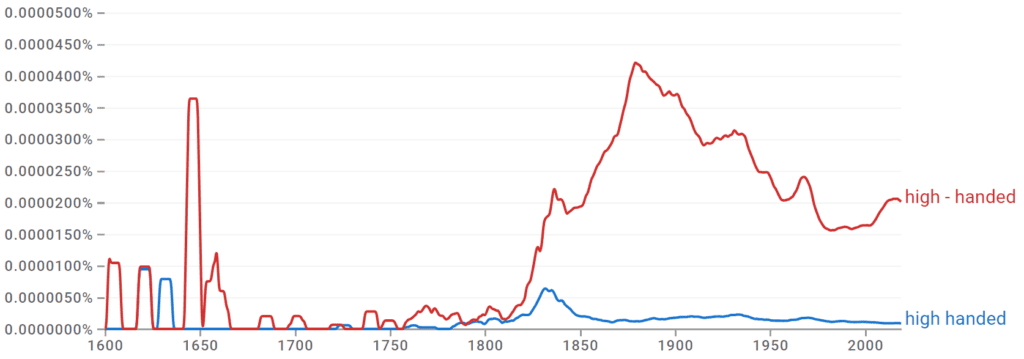High-handed is an adjective that describes someone who is overly authoritative or arrogant. This term has been around since at least the 17th century and may even have roots in the Bible.
Stick around to discover how this centuries-old idiom still packs a punch in today’s conversations!
Understanding High-Handed Idiom Meaning

High-handed is an adjective used to describe someone who acts in an arrogant, overbearing, or bossy way. Such a person tends to make decisions without considering others’ feelings or opinions.
For example:
- The staff felt that the administration was high-handed in their push to incorporate data-gathering into the curriculum.
- Her high-handed way of addressing the assembly didn’t win her any support.
The term can also describe behavior that is arrogant, authoritarian, unjust, or even oppressive.
For example:
- His high-handed approach to leadership held back progress within the company.
- The CEO’s high-handed behavior toward the board was so off-putting that they voted to fire him on the spot.
So, “high-handed” can help describe a range of overbearing behaviors, from simple bossiness to outright tyranny.
High-Handed Synonyms
You can replace high-handed with several other words, such as:
- Autocratic
- Domineering
- Dictatorial
- Arrogant
- Overbearing
For example:
- Her arrogant tone in addressing the assembly didn’t earn her any votes.
- The CEO was so domineering that the board immediately voted to fire and replace him.
Is High-Handed Hyphenated?
Yes, “high-handed” is hyphenated. It’s a compound adjective, where two separate words describe or modify a noun or pronoun. In cases like this, a hyphen is used to link the words and clarify their joint meaning.
High-Handed Origins

The term high-handed likely originated in the 17th century through a French translation. In French, the idiom is “haut la main,” which translates to “the high hand” in English. This French phrase comes from an even older expression, “avoir la haute main sur quelque chose,” meaning “to have the upper hand”—a phrase also adopted into English.
The idea of “having a high hand” dates back even further, suggesting a sense of power or control over someone or something. Its earliest figurative use appears to be in the 13th century. The Old English word “heahsynn” from that era suggests a deadly or severe crime.
Today’s use of high-handed echoes these historical meanings, signifying behavior considered harsh or socially unacceptable.
The idea of being high-handed may be even older than our etymology deep dive has uncovered. The expression, via translation, shows up in the Bible, Numbers 33:3. Although arguably the term may be associated with the translation, the relationship of the context cannot be ignored:
“And they departed from Rameses in the first month, on the fifteenth day of the first month; on the morrow after the Passover the children of Israel went out with a high hand in the sight of all the Egyptians.”
Here, “high hand” doesn’t imply overbearing behavior but rather speaks to a sense of pride and triumph as the Israelites left their bondage behind. While this Biblical usage may not align exactly with today’s meaning, it still contributes to the term’s rich history.
Let’s Review
The idiom high-handed has a long history, appearing in various forms since at least the 13th century. It may even have older roots, given its appearance in translated versions of the Old Testament.
High-handed serves as an adjective to describe someone arrogant, overbearing, or even oppressive. Be cautious when using this term; it’s a strong accusation that should only be applied when truly warranted. Misusing it could unfairly label someone in a negative light.
Enjoyed reading about this idiom? Check out some others we covered:
